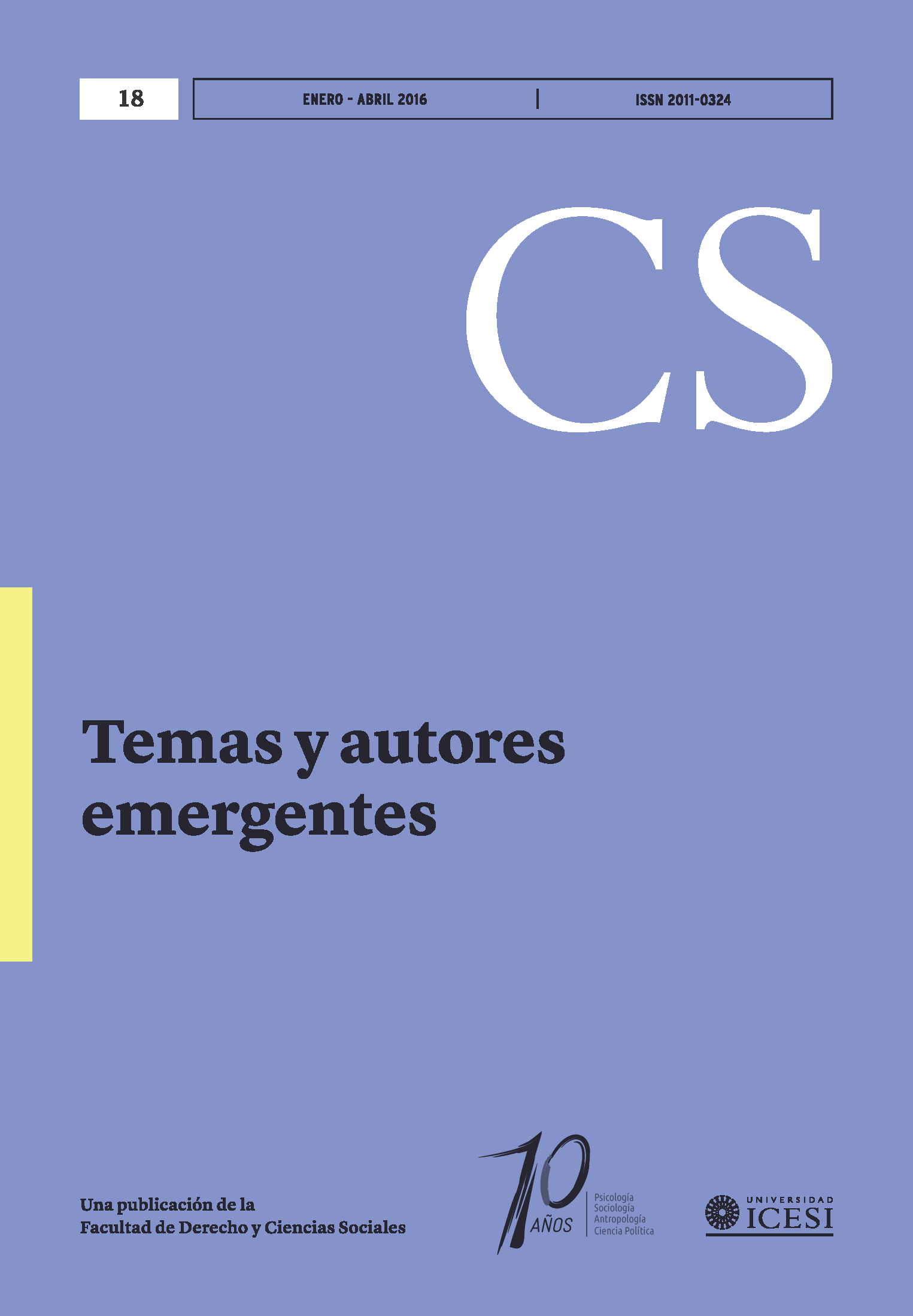Social representations of gender: The women/mothers as an instrument for development in the Chilean Government's Ethical Family Income program
DOI:
https://doi.org/10.18046/recs.i18.1943Keywords:
Gender, Social representations of gender, Poverty, Public policyAbstract
This article constitutes a critical reflection, from a gender approach, on the main aspects of the Chilean government program for overcoming poverty and/or extreme poverty: Ethical Family Income. Through the review of official documents, press releases and academic research, our main objective was to understand and analyze the representations of gender present in the social program and its implications for women, who have been identified as the main recipient. According to the analysis made, it was possible to see the instrumentalization of the women in their role as mediators between public policy and their families. The foregoing has led to the reproduction of traditional gender roles, which circumscribes women to a reproductive-domestic role, and not as a subject of rights.Downloads
References
Arriagada, I. (2003). Dimensiones de pobreza y políticas desde una perspectiva de Género [en línea]. http://www.cepal.org/mujer/reuniones/pobreza/sra_arriagada.pdf [consultado 26-09-2013].
Baeza, M. (2015). Breve análisis de la feminización de la pobreza en Chile. Revista Chilena de Derecho y Ciencia Política. 2 (6), 81-101.
Bravo . R. (1998). Pobreza y Desigualdad de Género. Una propuesta para el diseño de indicadores. Santiago, Chile: SERNAM.
Cecchini, S. y Madariaga, A. (2011). Programas de Transferencias Condicionadas. Balance de la experiencia en América Latina y el Caribe. Santiago, Chile: cepal –Asdi.
Centro de Estudios Instituto Igualdad . (2012). Comentarios al Proyecto de Ley sobre Ingreso Ético Familiar (Boletín N° 7992-06) [en línea]. http://www.igualdad.cl/wp-content/uploads/2012/03/COMENTARIOS-PL-INGRESO-ETICO-FAMILIAR.pdf [consultado 22-09-2013].
CEPAL. (2014). Panorama Social de América Latina [en línea]. http://ceal.co/wp-content/uploads/ sites/8/2015/01/S1420729_es1.pdf [consultado 26-08-2013].
CEPAL. (2011). Panorama Social de América Latina [en línea]. http://www.cepal.org/publicaciones/xml/9/41799/PanoramaSocial2010.pdf [consultado 29-02-2016]
CEPAL-UNIFEM. (2004). Entender la pobreza desde una perspectiva de Género [en línea] http://www.oei.es/decada/portadas/lcl2063e.pdf [consultado 26-08-2013].
Clert, C. (1998). De la vulnerabilidad a la exclusión: género y conceptos de desventaja social. En Arriagada. I y Torres. C (Eds.) Género y Pobreza. Nuevas dimensiones (pp.42-58) Santiago., Chile: Ediciones de las Mujeres.
Chant, S. (2003). Female Household Headship and the Feminization of Poverty: Facts, Fictions and Forward Strategies [en línea]. http://www.lse.ac.uk/genderinstitute/pdf/femalehouseholdheadship.pdf [consultado 01-02-2016]
Dubet, F. (2010). Repensar la justicia social. Contra el mito de la igualdad de oportunidades. Buenos Aires, Argentina: Siglo XXI.
INE, Instituto Nacional de Estad ísticas . (2015). Mujeres en Chile y Mercado del Trabajo. Participación laboral femenina y brechas salariales [en línea]. Consultado 29 febrero 2016. Disponible en: http://www.ine.cl/canales/chile_estadistico/estadisticas_sociales_culturales/genero/pdf/participacion_laboral_femenina_2015.pdf
Jordán, M. (2013). Pobreza: Concepto, medición y focalización [en línea]. http://www.munitel.cl/eventos/seminarios/html/documentos/2012/XXXVIII_ESCUELA_DE_CAPACITACION_CHILE/PTO_VARAS/PPT06.pdf [consultado 10-09-2013].
Larrañaga, O. (2010). El Estado Bienestar en Chile: 1910-2010 [en línea]. http://www.cl.undp.org/content/dam/chile/docs/pobreza/undp_cl_pobreza_estado_bienestar.pdf [consultado 10-09-2013].
Maffei, T. (2013). Análisis Crítico de las Políticas de Transferencias Monetarias Condicionadas: Efectos en las Mujeres. En XXIX Congreso de la Asociación Latinoamericana de Sociología (ALAS). Santiago: Asociación Latinoamericana de Sociología.
Martínez Franzoni, J. y Voorend, K. (2008). Transferencias Condicionadas e Igualdad de Género: ¿Blancos, Negros o Grises?. Revista Ciencias Sociales, 122 (4), 115-131.
Ministerio de Desarrollo Social. (2010). Informe Final Comité de Expertos en la Ficha de Protección Social. Consultado 22 Septiembre 2014. Disponible en: http://www.ministeriodesarrollosocial.gob.cl/comitefps/
Ministerio de Desarrollo Social. (2013). Ingreso Ético Familiar. Consultado 22 de Septiembre 2014. Disponible en: http://www.ingresoetico.gob.cl/que-es-IEF/
Ministerio de Desarrollo Social. (2013). Objetivos de Desarrollo del Milenio. Cuarto Informe del Gobierno de Chile [en línea]. Consultado 29 febrero 2016. Disponible en: http://www.ministeriodesarrollosocial.gob.cl/pdf/upload/Cuarto_Informe_ODM.pdf
Miranda, F. (2003). Capital social, pobreza y género. Aportes para la reflexión. Presentación Grupo de Discusión Pobreza y Género organizado por la Unidad Mujer y Desarrollo-CEPAL. Documento preliminar de discusión. Junio.
Moghadam, V. (2005). The ''Feminization of Poverty'' and Women's Human Rights [en línea]. http://www.cpahq.org/cpahq/cpadocs/Feminization_of_Poverty.pdf [consultado 01-02-2016]
Molineux, M. (2007). Change and Continuity in Social Protection in Latin America: Mothers at the Service of the State? [en línea]. http://www.unrisd.org/80256B3C005BCCF9/(httpAuxPages)/BF80E0A84BE41896C12573240033C541/$file/Molyneux-paper.pdf [consultado 01-02-2016]
Murguialday, C. (2006). Feminización de la pobreza [en línea]. http://www.dicc.hegoa.ehu.es/listar/mostrar/99 [consultado 01-02-2016]
Observatorio de la Igualdad de Género de América Latina y el Caribe (2012). Informe anual 2012. Los bonos en la mira. Aporte y carga para las mujeres [en línea]. http://www.cepal.org/publicaciones/xml/7/49307/2012-1042_OIG-ISSN_WEB.pdf [consultado 10-09-2014]
Pinto, R. (2012). Ingreso Ético Familiar [en línea]. http://dds.cepal.org/infancia/actividades/taller-regional-capacitacion-27-29-agosto-2013/docs_programa/ppt/dia2-02-Chile-Roberto-Pinto.pdf [consultado 10-09-2014].
Provoste, P. (2012). Protección social y redistribución del cuidado en América Latina y el Caribe: el ancho de las políticas [en línea]. http://repositorio.cepal.org/bitstream/handle/11362/5850/LCl3560_es.pdf?sequence=1 [consultado 20-09-2013].
Rodríguez, C. (2011). Programas de transferencias condicionadas de ingreso e igualdad de género ¿Por dónde anda América Latina? [en línea]. http://iis7-e2.cepal.org/publicaciones/xml/3/45263/Serie_109_Corina_Rodriguez.pdf [consultado 21-08-2013].
Sen, A. (2000). Desarrollo y libertad. Madrid, España: Editorial Planeta.
Scott, J. (1990). El género: Una categoría útil para el análisis histórico. En: Amalang. J y Nash. M (Eds.) Historia y Género. Las mujeres en la Europa moderna y contemporánea (pp.24-56) Valencia., España: Alfons El Magnànim.
Youtube . Ministro Lavín explica los alcances del proyecto Ingreso Ético Familiar. Santiago. Consultado 7 Septiembre 2013. Disponible en: https://www.youtube.com/watch?v=uXvhKPMCMt4
Downloads
Published
Issue
Section
License
Copyright (c) 2016 Karina Ahumada, Tania Monreal, Loreto Tenorio

This work is licensed under a Creative Commons Attribution-NonCommercial 4.0 International License.
© Reserved Copyright
Material in this publication may be reproduced without authorization, provided the title, author and institutional source is acknowledged.
The content published in Revista CS is distributed under the Creative Commons BY-NC 4.0 Attribution/Recognition-NonCommercial 4.0 International license.
You are free to:
Share — copy and redistribute the material in any medium or format.
Adapt — remix, transform, and build upon the material.
Under the following terms:
Attribution — You must give appropriate credit , provide a link to the license, and indicate if changes were made . You may do so in any reasonable manner, but not in any way that suggests the licensor endorses you or your use.
NonCommercial — You may not use the material for commercial purposes.












